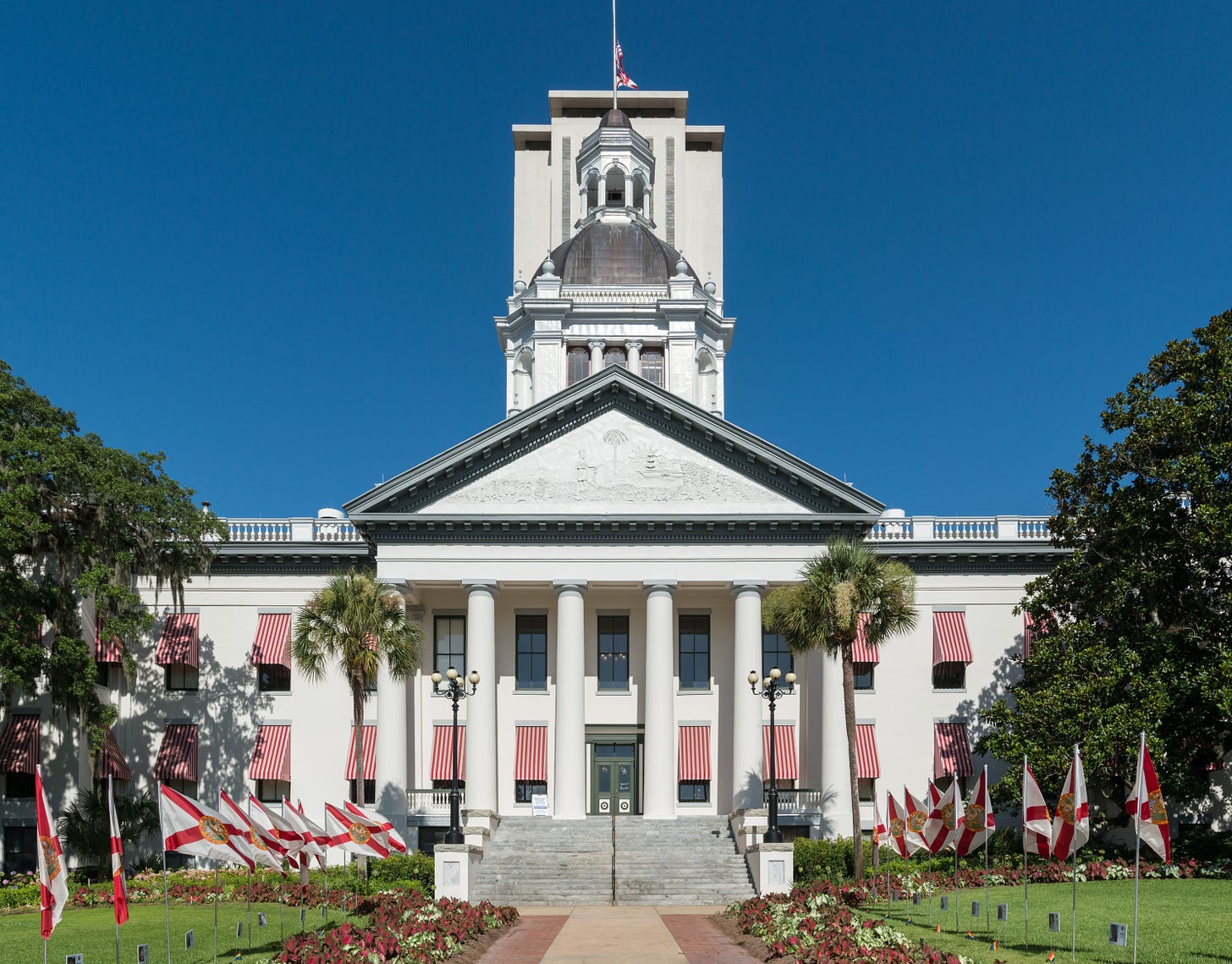An influential landlord was accused of breaking the law. The Florida Legislature may change the law.
A bill in the state Legislature could undercut a lawsuit against an apartment complex linked to one of Florida's biggest and most politically powerful corporations.

This is Seeking Rents, a newsletter and podcast devoted to producing original journalism — and lifting up the journalism of others — that examines the many ways that businesses influence public policy across Florida, written by Jason Garcia. Seeking Rents is free to all. But please consider a voluntary paid subscription, if you can afford one, to help support our work.
There’s a little legal spat playing out right now out inside small-claims court in Palm Beach County.
The financial stakes are truly tiny: Attorneys working with a pair of tenants have sued their former apartment complex for failing to return a $500 security deposit.
But the case could have statewide consequences.
That’s because the apartment complex is connected to one of Florida’s most powerful corporations: Florida Crystals, the big sugar producer that owns an apartment subsidiary with more than 4,500 units across southern Florida.
And Florida lawmakers are rushing in to help.
The help is in the form of House Bill 1305 and Senate Bill 1466, a pair of bills moving through the Legislature this session that would tweak the state’s rules for security deposits.
Under Florida’s landlord and tenant laws, a landlord is supposed to keep a tenant’s security deposit in a separate bank account. The money cannot be co-mingled with other funds, and the landlord cannot use it to make more cash for themselves — by pledging the deposit as collateral on a loan, for instance. And that account must be at a “Florida banking institution.”
Florida’s landlord and tenant laws don’t specifically define “Florida banking institution.” But the state’s banking laws spell out a very similar term — “Florida bank” — as a bank that is chartered in Florida.
That’s now causing a headache for Catalina at Miramar, a townhome apartment complex across from the Turnpike in South Florida.
The complex is technically owned by an obscure company called Eatmira II LLC. But corporate records show Eatmira II LLC is controlled by FCI Residential — a multifamily development and management firm that is owned by Florida Crystals, according to its website.
A pair of former tenants at Catalina at Miramar who say they never got their security deposit back are now working with a law firm that has sued the complex, accusing it of, among other things, breaking the law by keeping the tenants’ security deposit in an account with JP Morgan Chase — a nationally chartered bank based in New York.
The company is now at at risk of not only paying back the security deposit plus interest, but also attorney fees and costs that could add up to thousands of dollars.
This is where HB 1305 and SB 1466 come. The bills would add a sentence to Florida’s landlord and tenant laws explicitly allowing landlords to keep security deposits in national banks like JP Morgan Chase.
The Senate version of the bill breezed through the Senate Judiciary Committee last week on a 10-0 vote. During her presentation, the bill sponsor — Sen. Erin Grall (R-Vero Beach) — read from a statement in which she suggested that landlords across Florida are being plagued with frivolous lawsuits over this issue, by nitpicking attorneys using it as leverage to demand thousands in legal fees.
“These lawsuits claim that a security deposit held in a national bank whose original chartered home state is not the state of Florida — like Bank of America, for example — violates state law,” Grall said. “As a result, landlords who hold security deposits in one of these banks are subject to costly and unnecessary litigation.”
Grall said that “over 150” such cases have been filed in Palm Beach County alone. But legislative analysts identified only one: The case against Catalina at Miramar.
Grall did not respond to requests for comment. Nor did the attorneys for Catalina at Miramar and Florida Crystals.
On one level, this might seem like a ticky tack foul. JP Morgan is obviously a reputable bank, and it’s not hard to find in Florida.
But Brian Korte, the attorney leading the lawsuit against Catalina at Miramar, contended that the legislation would hurt tenants.
Korte said that some landlords routinely flout the rules around security deposits — mixing the money with other funds, for instance, then stashing it in interest-bearing accounts and keeping the interest for themselves.
But to prove that, tenants and their attorneys need to access bank records. Korte said those records are a lot harder to get when it requires pulling documents or answers out of a multinational corporation like JP Morgan or Bank of America rather than a smaller bank that is based locally and answers to Florida regulators.
“This just muddies the water worse,” Korte said. “They keep eroding more of these consumer protections.”
Beyond that, though, this is yet another example of whose problems the Florida Legislature solves.
Families are being forced to move out of Florida because property insurance has become so expensive. Yet a bill to give Floridians a true public option — one that the Republican sponsor says would cause insurance premiums to “drop like a rock” — hasn’t been granted a single hearing.
Florida has the most unfair tax code in the country, one that taxes the poorest families nearly five time as much as the richest ones. Yet a bill to give a big tax break to working-class families hasn’t budged an inch.
But when an apartment complex connected to one of Florida’s biggest corporations gets accused of breaking the law, legislation starts moving to change that law. (It probably doesn’t hurt that Florida Crystals is one of the largest campaign contributors in the state; records show it has made more than $1 million in state campaign contributions just in the roughly eight months since last year’s session ended.)
Now, Grall said during last week’s Senate Judiciary Committee meeting that she did not think her bill would impact any current litigation. “I don’t believe that there’s anything in the bill that would be retroactive,” she said.
But there was nothing retroactive in another bill the Florida Legislature passed last year to prevent lawsuits against power companies after a hurricane. That hasn’t stopped utility giant Florida Power & Light from trying to use the new law to kill a lawsuit against the company that was filed long before state lawmakers stepped in.




